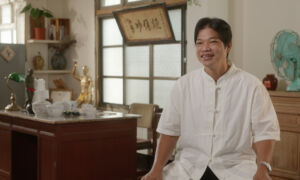Chinese Community Finds Hope and Meaning in Lunar New Year Message
In the past, when Chinese people wondered about the meaning of life, they looked to the Confucian classics or brought their questions to monasteries and temples.But this tradition has been decimated, a result of the Communist Party’s decadeslong campaign to eradicate traditional beliefs and replace them with Marxist-Lenninist ideologies of materialism and atheism. Nowadays, many in China have rejected traditional values and turned their focus on seeking personal gain, grounded in an absolute belief in materialism and science. “But for the real truth we are seeking, it’s hard to find it from science,” said Li Mianying, a Chinese philosopher and entrepreneur who recently moved to the United States. “The pursuit of science and technology has pushed human beings to the brink of destruction,” he said. Modern science has resulted in the rejection of traditional beliefs and moral values, Li added. “As science and technology develop, we may destroy ourselves before the destruction of the earth.” So where can people find the purpose of life? The Chinese immigrant found insight from a recent article, “How Humankind Came To Be” by Mr. Li Hongzhi, the founder of the traditional spiritual discipline Falun Gong. The article was released as a message for the Lunar New Year last month. “[The article] is not only meaningful to Chinese culture, but also to the entire humanity,” said Li Mianying, who has no relation to the article author. “Why did Marx insist on the essence of the world being material and deny the spiritual world? It’s not an issue of science or philosophy. Marx wanted to use [materialism] to deny compassion, spirituality, and God,” Li explained. Decades of communist campaigns left many with little respect for the divine. People now go to temples to pray for money, rather than contemplate their mistakes with a sincere and respectful heart toward Buddha. “The inner meaning of religion has been changed,” Li said. Because of this, the introduction of Falun Gong in China in 1992 represented “a very important turning point” for the country, according to Li, and helped bring about a renaissance of Chinese culture and civilization. Supporters of the Falun Gong spiritual exercise take part in a march in Hong Kong on April 27, 2019. (Dale de la Rey/AFP via Getty Images) Falun Gong, also known as Falun Dafa, is rooted in traditional Chinese belief systems that involve moral improvement leading to spiritual enlightenment. Composed of gentle, meditative exercises along with moral teachings based on the principles of truthfulness, compassion, and forbearance, the practice quickly attracted people from all backgrounds, from rural villagers to college professors. By 1999, seven years after the discipline was first spread, there were an estimated 70 to 100 million people practicing across the country. While Li Mianying didn’t take up the practice, the Chinese expatriate said he is now reading Falun Gong’s books, as was amazed by Mr. Li’s insight into the universe. The Meaning of Life’s Hardships Tammy, a Hongkonger and mother now living in Toronto, often saw hundreds of Falun Gong practitioners marching through the streets of the thriving East Asian metropolis. Tammy knew they were calling for an end to the ongoing persecution happening in the mainland. In 1999, then-Chinese leader Jiang Zemin, who deemed Falun Gong’s booming popularity as a threat to the Party’s control, ordered a severe campaign to eradicate the discipline, resulting in millions of adherents being thrown into detention, where they are brainwashed, tortured, or even killed for their organs. But the persecution didn’t reach Hong Kong—a former British colony that once enjoyed freedoms and autonomy unseen in the mainland—where people are free to practice Falun Gong. A parade led by Falun Gong’s Tianguo marching band in Hong Kong on May 10, 2015. (The Epoch Times) While Tammy often saw adherents peacefully protesting the persecution in Hong Kong, said she didn’t understand what the practice was about until last year when she settled in Canada and was personally introduced to a Falun Gong practitioner, who was the parent of her son’s classmate. After reading the article by Falun Gong’s founder, Tammy, who is not an adherent of the practice, said Mr. Li’s essay solved many puzzles she has sought to answer. “Why are there hardships in human life? It’s because people are made to temper themselves through the experience and thus they can elevate,” Tammy said, explaining her understanding of the essay. The mother of a 6-year-old boy spoke to The Epoch Times using only her first name, for fear of retribution from the communist regime. In the article, Mr. Li said that the universe goes through the process of “formation, stasis, degeneration, and destruction,” just as human beings experience “birth, aging, illness, and death,” and that the human world is currently at the last period of the destruction phase. Mr. Li’s illustration of the universe

In the past, when Chinese people wondered about the meaning of life, they looked to the Confucian classics or brought their questions to monasteries and temples.
But this tradition has been decimated, a result of the Communist Party’s decadeslong campaign to eradicate traditional beliefs and replace them with Marxist-Lenninist ideologies of materialism and atheism. Nowadays, many in China have rejected traditional values and turned their focus on seeking personal gain, grounded in an absolute belief in materialism and science.
“But for the real truth we are seeking, it’s hard to find it from science,” said Li Mianying, a Chinese philosopher and entrepreneur who recently moved to the United States.
“The pursuit of science and technology has pushed human beings to the brink of destruction,” he said. Modern science has resulted in the rejection of traditional beliefs and moral values, Li added. “As science and technology develop, we may destroy ourselves before the destruction of the earth.”
So where can people find the purpose of life? The Chinese immigrant found insight from a recent article, “How Humankind Came To Be” by Mr. Li Hongzhi, the founder of the traditional spiritual discipline Falun Gong. The article was released as a message for the Lunar New Year last month.
“[The article] is not only meaningful to Chinese culture, but also to the entire humanity,” said Li Mianying, who has no relation to the article author.
“Why did Marx insist on the essence of the world being material and deny the spiritual world? It’s not an issue of science or philosophy. Marx wanted to use [materialism] to deny compassion, spirituality, and God,” Li explained.
Decades of communist campaigns left many with little respect for the divine. People now go to temples to pray for money, rather than contemplate their mistakes with a sincere and respectful heart toward Buddha. “The inner meaning of religion has been changed,” Li said.
Because of this, the introduction of Falun Gong in China in 1992 represented “a very important turning point” for the country, according to Li, and helped bring about a renaissance of Chinese culture and civilization.

Falun Gong, also known as Falun Dafa, is rooted in traditional Chinese belief systems that involve moral improvement leading to spiritual enlightenment. Composed of gentle, meditative exercises along with moral teachings based on the principles of truthfulness, compassion, and forbearance, the practice quickly attracted people from all backgrounds, from rural villagers to college professors.
By 1999, seven years after the discipline was first spread, there were an estimated 70 to 100 million people practicing across the country.
While Li Mianying didn’t take up the practice, the Chinese expatriate said he is now reading Falun Gong’s books, as was amazed by Mr. Li’s insight into the universe.
The Meaning of Life’s Hardships
Tammy, a Hongkonger and mother now living in Toronto, often saw hundreds of Falun Gong practitioners marching through the streets of the thriving East Asian metropolis.
Tammy knew they were calling for an end to the ongoing persecution happening in the mainland. In 1999, then-Chinese leader Jiang Zemin, who deemed Falun Gong’s booming popularity as a threat to the Party’s control, ordered a severe campaign to eradicate the discipline, resulting in millions of adherents being thrown into detention, where they are brainwashed, tortured, or even killed for their organs.
But the persecution didn’t reach Hong Kong—a former British colony that once enjoyed freedoms and autonomy unseen in the mainland—where people are free to practice Falun Gong.

While Tammy often saw adherents peacefully protesting the persecution in Hong Kong, said she didn’t understand what the practice was about until last year when she settled in Canada and was personally introduced to a Falun Gong practitioner, who was the parent of her son’s classmate.
After reading the article by Falun Gong’s founder, Tammy, who is not an adherent of the practice, said Mr. Li’s essay solved many puzzles she has sought to answer.
“Why are there hardships in human life? It’s because people are made to temper themselves through the experience and thus they can elevate,” Tammy said, explaining her understanding of the essay.
The mother of a 6-year-old boy spoke to The Epoch Times using only her first name, for fear of retribution from the communist regime.
In the article, Mr. Li said that the universe goes through the process of “formation, stasis, degeneration, and destruction,” just as human beings experience “birth, aging, illness, and death,” and that the human world is currently at the last period of the destruction phase.
Mr. Li’s illustration of the universe strongly resonated with Tommy who experienced how the Chinese Communist Party in recent years turned Hong Kong into just another mainland city. In 2019, during months of massive pro-democracy protests, Tammy observed police officers beat, and fire rubber bullets and tear gas at unarmed demonstrators under Beijing’s directives.

Such bloody scenes saddened her. “[I thought] police were supposed to uphold justice,” Tammy said. “That’s why I was so disappointed. I even felt that righteousness seemed to be destroyed.”
But Tammy was able to find hope in Mr. Li’s essay, saying she felt relieved after learning the deeper reasons behind human suffering.
“Everything is arranged by the divine beings. By going through hardships, we can accumulate virtue and elevate ourselves through spiritual practice, thus leaving the lowly human level,” she said.
Humankind’s ‘Only Yearning’
Mr. Li’s explanation of the reasons behind winning or losing in life also left an impression on Huang Yong-he, the owner of a traditional Chinese medicine clinic in Taiwan’s Tainan city.
In the past, Huang often wondered where his wisdom came from. At the age of 13, when he graduated from primary school, Huang started to help his father, an accomplished traditional Chinese medicine practitioner, to take care of the clinic.
The first step was to learn hundreds of medicinal plants and herbs, an extremely difficult task. But Huang took to it like a duck to water. He felt as though the names and effects of the many different herbs gelled with his brain, as so was able to memorize the information much faster than others.
“Talents are also a kind of ‘blessings and virtues’ that were built up in previous lives,” Huang said, referring to Mr. Li’s explanation in the essay of the cause of a person’s wealth and fortune.

Looking back on his life, Huang realized that divine beings have taken care of him for a very long time. The patients of his clinic, Huang said, may also have been arranged by Heaven.
Huang was glad that he kept doing good deeds and helped others during the past decades. While he didn’t expect rewards, Huang said he enjoyed the sense of accomplishment. “I used to think life’s meaning was about working hard, enjoying fulfillment, making money, and preparing for retirement,” Huang said.
“After reading Mr. Li’s article, I really believe that no matter how great the wealth and influence we have in this world, what’s the use if we can’t re-ascend to Heaven?
“In this secular world, humankind suffers, atones for their sins while helping others and accumulating blessings and virtue. But building these up is not our purpose. Returning to heaven is our only yearning!”
Luo Ya, Yang Xinwen, and Yu Yuan contributed to this report.







